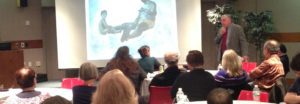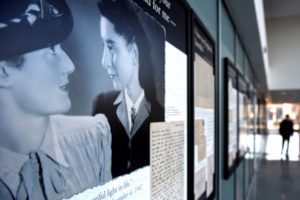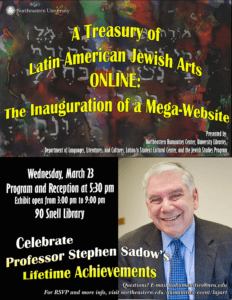
Jewish Studies celebrated Professor Stephen Sadow’s lifetime achievements and the debut of his website, Latin American Jewish Writers and Artists, on March 23. A Professor of Spanish and Latin American Literature, Sadow has spent his over 30-year career at Northeastern researching and writing about Jewish artists from Latin America, as well as celebrating and promoting their art. His new website (http://latinjewisharts.northeastern.edu) expands an existing website on visual and plastic arts to include Latin American Jewish writers. The site, in both English and Spanish, includes four books of poetry, two of which are accompanied by striking visual images, and videotaped interviews with Latin American writers and artists. It also incorporates Sadow’s original site, which currently features short biographies of 129 artists and examples of each artist’s work. The site enables scholars and others to research these artists whose work is often not well known outside their communities. Many of the artists come from Argentina, the Latin American country with the largest Jewish population; artists from Uruguay, Peru, Venezuela, Costa Rica, Mexico, Bolivia, Colombia and Brazil are also represented.
The development of this website, in conjunction with the Northeastern Library’s Digital Scholarship Group, caps Sadow’s distinguished career at Northeastern, from which he is retiring this spring. Along with pioneering a website that combined research and visual imagery, Sadow edited King David’s Harp: Autobiographical Essays by Jewish Latin American Writers, winner of the National Jewish Book Award, and translated both Mestizo, a novel by Argentine writer Ricardo Feierstein, and Unbroken: From Auschwitz to Buenos Aires, the autobiography of Holocaust survivor Charles Papiernik. Sadow also published over one hundred articles, book chapters, literary translations, book reviews, textbooks and teacher guides.
To honor Sadow’s accomplishments and herald the expanded website, which Sadow will continue to edit and direct, Jewish Studies, along with the Humanities Center, Department of Languages, Literatures and Cultures, and Latino/a Student Cultural Center, sponsored the March 23 event. The speakers, who included Jewish Studies Program director Lori Lefkovitz and Languages, Literatures and Cultures Chair José Buscaglia, attested to Sadow’s many contribution to Jewish Studies, to language studies, and to Northeastern generally.

Photo by: Matthew Modoono/Northeastern University
Sadow’s celebration was the highlight of a busy semester of Jewish Studies activities. It began in January with Holocaust Awareness Week. Organized around the theme of “Stories of Slave Labor and the Art of Freedom,” the week featured a full set of events, including an exhibit, a staged reading of a play, a film screening, and a survivor’s talk, as well as the 24th Annual Robert Salomon Morton Lecture. This year’s Morton lecture was a panel discussion that opened the exhibit of 300 letters sent to a young woman, Sala Garncarz, during her five years imprisoned in Nazi labor camps. The panelists, led by Ann Kirschner, Sala’s daughter and author of the book Sala’s Gift, discussed how the letters were transformed into a book, an exhibit, a play and a documentary film.
Jewish Studies also brought Adele Reinhartz, a Professor in the Department of Classics and Religious Studies at the University of Ottawa, to campus for a lecture on whether Jesus Christ should be considered a good Jew in terms of his degree of Jewish observance, as seen through the prism of Christian commentators.
On Feb. 29, the documentary film, “The Amazing Nina Simone” on the singer and civil rights activist, was screened, followed by a discussion with the filmmaker, Jeff Lieberman, and Professor William Miles.
Various aspects of Israeli society were featured in several lectures. On Feb. 9, Professor Miles of the political science department described his experiences living the previous fall in a Druze village near the Lebanon border. On March 2, Erez Tzfadia, a professor of public policy and administration at Sapir Collage in Israel, explained his ongoing study of Israel’s spatial politics and its influence on land allocation. On March 25, Dina Kraft of Northeastern’s School of Journalism, discussed the effect of trauma on journalists, particularly her own experience covering conflict for the Associated Press in Israel and South Africa. To finish the semester on a high note, Derek Penslar, the Stanley Lewis Professor of Modern Israel Studies at the University of Oxford and the Samuel J. Zacks Professor of Jewish History at the University of Toronto, delivered a lecture on Theodor Herzl as a Zionist leader on April 11.
Read the rest of the Spring 2016 Haverim Newsletter here.




